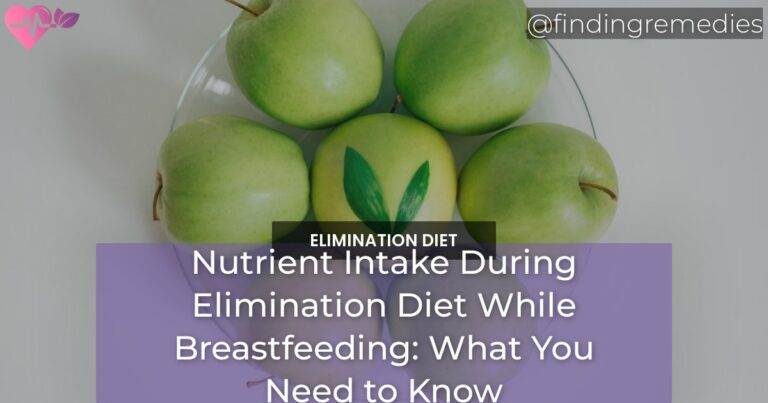Elimination diets are often recommended by doctors to breastfeeding mothers whose babies display symptoms of food allergies or sensitivities. The goal of the elimination diet is to eliminate certain foods from the mother’s diet to see if it helps alleviate the baby’s symptoms. While the elimination diet can be effective, it can also lead to nutrient deficiencies.
In this article, we will discuss the importance of nutrient intake during elimination diet while breastfeeding, nutrient deficiencies associated with elimination diet, and tips for meeting nutrient needs during elimination diet while breastfeeding.
Table of Contents
Importance of Nutrient Intake During Elimination Diet While Breastfeeding
Nutrient intake is essential for both the mother and the baby during breastfeeding. A mother’s diet can impact the quality and quantity of milk produced, and it can also impact the baby’s growth and development. Therefore, it is important for breastfeeding mothers to consume a well-balanced diet that meets their nutrient needs.
However, elimination diets can pose a challenge to achieving adequate nutrient intake. Eliminating specific food groups from the diet can result in a lack of essential nutrients, leading to nutrient deficiencies.
Understanding Elimination Diet
An elimination diet involves avoiding certain foods from the mother’s diet for a set amount of time to determine if it is causing any adverse reactions in the baby. The foods eliminated are usually those that commonly cause allergies or sensitivities, such as dairy, soy, wheat, eggs, nuts, and fish.
The duration of the elimination diet can vary, depending on the specific situation, but typically lasts 2-6 weeks. After the elimination phase, foods are gradually reintroduced to the mother’s diet to determine which ones are causing the baby’s symptoms.
ALSO READ
Nutrient Deficiencies Associated With Elimination Diet
Calcium
Calcium is essential for the development of strong bones and teeth, and it also plays a crucial role in the regulation of the heart, muscles, and nerves. Dairy products are the primary source of calcium in the diet, and eliminating them can put breastfeeding mothers at risk of calcium deficiency.
How can I ensure I am still getting enough calcium while following an elimination diet while breastfeeding?
- Consume other calcium-rich foods, such as dark leafy greens, fortified foods, and supplements.
- Choose non-dairy milk alternatives, such as almond milk, that are fortified with calcium.
Iron
Iron is essential for the production of hemoglobin, which carries oxygen to the body’s cells. Iron deficiency can lead to anemia, which can cause fatigue, weakness, and shortness of breath. Meat is the primary source of iron in the diet, and eliminating it can put breastfeeding mothers at risk of iron deficiency.
How can I make sure I am still getting enough iron while following an elimination diet while breastfeeding?
- Consume plant-based sources of iron, such as beans, lentils, fortified cereals, whole grains, nuts, and seeds.
- Pair iron-rich foods with vitamin C-rich foods to enhance iron absorption.
- Consider taking an iron supplement if necessary.
Fiber
Fiber is essential for maintaining digestive health and regularity, and it can also help lower cholesterol levels and reduce the risk of heart disease. Whole grains, fruits, vegetables, and legumes are the primary sources of fiber in the diet, and eliminating them can put breastfeeding mothers at risk of fiber deficiency.
How can I ensure I am still getting enough fiber while following an elimination diet while breastfeeding?
- Consume other fiber-rich foods, such as whole fruits, vegetables, and legumes.
- Choose low-FODMAP fiber sources if necessary.
Vitamin D
Vitamin D is essential for the absorption of calcium and the development of strong bones and teeth. Fatty fish and fortified foods, such as juices and cereals, are the primary sources of vitamin D in the diet, and eliminating them can put breastfeeding mothers at risk of vitamin D deficiency.
How can I ensure I am still getting enough vitamin D while following an elimination diet while breastfeeding?
- Consume other vitamin D-rich foods, such as fatty fish or fortified juices.
- Consider taking a vitamin D supplement if necessary.
Tips for Meeting Nutrient Needs During Elimination Diet While Breastfeeding
- Focus on consuming a variety of nutrient-rich foods.
- Consult with a dietitian or healthcare professional to identify potential nutrient deficiencies and develop a plan to meet nutrient needs.
- Consider taking a multivitamin or specific nutrient supplements if necessary.
Conclusion
A well-balanced diet is essential for breastfeeding mothers, and the elimination diet can pose a challenge to achieving adequate nutrient intake. However, by consuming a variety of nutrient-rich foods and considering supplements if necessary, breastfeeding mothers can meet their nutrient needs while following an elimination diet.
RELATED ARTICLES:

